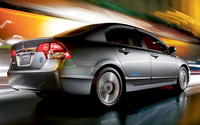Honda Stonewalls on Civic GX (CNG) Availability
MORE: 150 CNG Stories, Opinion and Event Video Coverage
This continuing coverage on America’s oil crisis arises from the just released book, The Plan: How to Save America When the Oil Stops—or the Day Before (Dialog Press).
By Edwin Black
 Edwin Black |
Recent media reports that Honda has been suppressing proliferation of its Civic GX, hailed by environmental advocates as “the greenest car in America,” have stung the otherwise respected carmaker. It has refused to answer those in the CNG industry and media asking for a response and has dubbed some of its critics as “extremists” that the company need not answer or engage. At the same time, the company has persisted in its refusal to sell GX cars to those who want them and has now abruptly terminated the much-touted deal to sell T. Boone Pickens its control of the Fuelmaker company which produces the all-important home refueling device, Phill. Sources at Honda suggest the firm may be waiting to see if the negative attention dies down.
Honda only manufactured about 1000 Civic GX vehicles in the past year, and denies them to almost all American markets. The few GX cars it produces are mainly sold in just two states, New York and California. Honda denies the vehicle to even the most insistent dealers throughout the nation. In fact, having sold out its 2008 fleet, the Japanese carmaker simply suspended production altogether. The company claims it will double output by the middle of 2009 to roughly 180 cars per month, but many observers still see that as a token number. By contrast, Honda recently inaugurated mass production at its newest North American factory in Indiana, where it will produce some 200,000 gasoline-burning Civics, and made a similar move in a Canadian plant. The company produces more than one million cars annually in North America.
In its most visible and well-documented market denial, Honda has refused to sell even one CNG car to Spokane Community College despite a year of efforts by the school’s administration. Spokane Community College had earnestly tried to become an epicenter for the movement to get off oil by purchasing a fleet of GX vehicles, training students to service them nationwide as certified mechanics, and advocating a fast-growing, real world CNG expansion throughout the city, subsequently amplifying it into a CNG corridor stretching from Seattle to Denver. The Spokane area sits astride a major natural gas pipeline. But Honda refused to sell even one car or any home refueling devices despite months of efforts. Schools officials were in disbelief, especially as the country’s fuel crisis worsened.
Edwin Black recently spoke at the Western Automotive Journalists' Future Fuels Symposium in South San Francisco. CLICK HERE to watch the complete presentation.
Weeks after the GX revelations, Spokane is still unable to purchase a single GX. A senior official at Spokane Community College complained, “Honda is still dragging its feet. They still won’t sell us a car.” Another school official declared, “I think someone will come along and just knock Honda out of its position if they won’t sell these cars.”
Company sources indicate that a new GX dealer will be authorized, not in Spokane but 90 miles away, conceding that even that dealership won’t get any quota until well into 2009. Spokane sources scoffed at the idea of purchasing and servicing cars from a dealer 90 miles away. “That’s as good as saying it’s impossible,” said one Spokane resident. “Who runs down to the local dealer 90 or 100 miles away?”
Honda dealership documents obtained exclusively by this reporter reveal that the company is already planning for a GX shortage in mid-2009. Company correspondence to CNG-hungry dealers virtually admitted the firm was creating the GX shortage as part of a long-term strategy. The letter stated, “American Honda anticipates that demand for the remaining East Liberty production of 2009 Civic GXs will surpass available supply. Therefore, American Honda's Alternative Fuel Vehicles (AFV) Department will again use the recently introduced "GX Order Allocation Program.” We have a very limited number of GX vehicles available from the December build, so your wholesale opportunities will be severely limited.” The letter then laid out a mere three-day window, from September 9, 2008 to September 12, 2008, in which dealers would be allowed to order a quota of GX cars.
Ironically, while handcuffing its GX production despite the demand, Honda company officials are scrambling to stimulate sales of its Pilot SUVs, which achieve just 15-16 MPG (ranked among the worst gas guzzlers on America’s streets) as well as its Odyssey minivan which achieves about 20 MPG in city driving. During the height of oil price hikes, Americans abandoned such vehicles in droves. Honda, like other carmakers, was compelled to slash production. Odyssey minivan and Pilot SUV production was cut by a reported 10,000 units per year, and now new plans will subtract another 22,000 units.
Most disappointing to many CNG observers was the September 3, 2008 announcement that plans were terminated by Honda to sell T. Boone Pickens its Fuelmaker interest. The sale price was $17 million. Pickens has been spending many more millions in advertising to convince Americans that one path to fuel independence is to switch to CNG vehicles as a bridge technology. The mercurial oil magnate also controls vast amounts of natural gas through his company, Clean Energy.
Under the terms of the purchase agreement, either Clean Energy or Honda had the right to terminate the purchase agreement without any obligation or liability if the closing did not occur on or before October 3, 2008. But the closing did not occur by October 3, 2008, according to a Clean Energy corporate document obtained by this reporter, “primarily due to the fact that the sellers (Honda and Fuelmaker) were unable to deliver audited financial statements by October 3rd for FuelMaker Corporation’s parent company, a subsidiary of Honda, which financial statements were required to be prepared in accordance with Canadian generally accepted accounting principles and reconciled to U.S. generally accepted accounting principles.”
Clean Energy information asserts, “We continued negotiations with Honda after October 3, 2008 to extend the Share Purchase Agreement on revised terms.” But on October 13, 2008, “Honda delivered to us a notice that it intended to terminate the purchase agreement; and, after subsequent discussions, on October 15, 2008, we and Honda mutually agreed to terminate the purchase agreement in accordance with its terms.”
CNG industry sources suggest the talks may be revived. But for now, the effort to move this country off petroleum and onto CNG continues to be stalled. An unscientific Cutting Edge News poll now active on the site indicates that some 71 percent of polled readers believe Honda should lose its patents if it does not accelerate its GX technology. Honda declined to respond on the record to inquiries.
Edwin Black, who has always driven Honda cars, is the New York Times best selling investigative author of IBM and the Holocaust, Internal Combustion and the just released best selling book, The Plan: How to Save America When the Oil Stops—or the Day Before (Dialog Press), from which this article is adapted. More information about The Plan can be found at www.planforoilcrisis.com.



